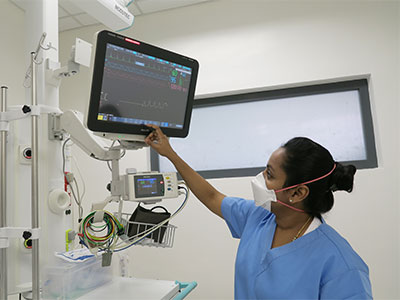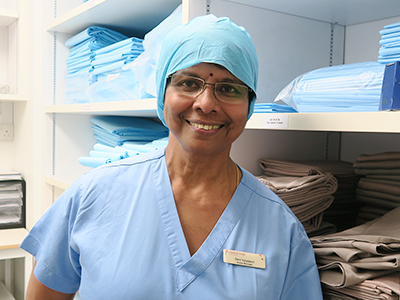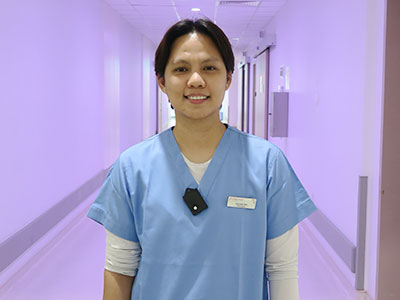
Featuring Nurse Clinician Nisha Mary Martin (ICU) and Senior Staff Nurse Katrina Chan, IPS 9
Nurses are caring and compassionate professionals who wear many hats. Apart from being caregivers, they also hold an important role as patient advocates. While they can be seen flashing their best smile to cheer on patients and their family, there is a solemn side to all nurses that will only show up in critical times.
As patient advocates, nurses are expected to intervene when there is a care concern and ensure that proper channels are followed according to the best interests of the patient. Sometimes, this means questioning their superiors and challenging instructions when things do not seem right.
For Nurse Clinician (NC) Nisha Mary Martin, patient advocacy is something she has always been big on. This comes as no surprise seeing how she has been in the intensive care unit (ICU) for the last 18 years, attending to patients who are intubated, ventilated and often on life-sustaining medication drips.
“A particular trait I’ve been propagating to our nurses is to consider ourselves as our patients’ advocate. The ICU is a place where patients’ illness is at its peak and we have to care for those who are vulnerable and sick,” shared Nurse Clinician (NC) Nisha Mary Martin.
“Patients who are here (ICU) may not be able to communicate so we have to monitor them closely and act as their advocate,” NC Nisha added.
In nursing, patient advocacy takes place wherever there are patients. This is no exception even in the wards.
“When going through treatments, patients are often in pain. They may feel upset and hopeless. What I would do is try to listen to them and their concerns, and help ease their anxiety,” explained Senior Staff Nurse (SSN) Katrina Apolinar Chan from IPS 9, a multidisciplinary ward.


Just like how the advent of the internet and advancement of technology has changed the way we live and work, the art of nursing has also changed a great deal. In the past, nurses used to carry out a more conservative role where they would assist doctors and follow instructions. Nurses today face a different climate and are in fact, given more in patient care.
“Doctors would only see patients for five to 10 minutes. As nurses, we will be seeing them throughout our 12 hours shift,” shared SSN Katrina, “Most of the time, we have to make decisions for patients.”
With nurses being there for patients round the clock, it is no surprise that the onus is on them to make important decisions for patients.
“During my early nursing days in India, we (nurses) can never have a say. Doctors are always taking the lead. Nursing is different today as we get to lend our voice in the care plan based on the recorded vital signs and observations,” NC Nisha revealed.
“In advocating, we ensure that our patients' autonomy and choices are respected. Serving as the link between patients and the doctors, we also contribute to the patient and family decision-making. We speak up when problems go unnoticed or when the patient or family can't or won't address them. Every change matters,” she added.

Nurses play a huge part in patient’s lives and are also looked upon highly by their families. Nurses are expected to know why patients are going through a particular treatment. With great power – in this case, autonomy – comes great responsibility. According to NC Nisha, this is where her knowledge of evidence-based nursing (EBN) comes in.
“In the past, nurses merely follow protocols because they were told to do so. Most of them are not able to share the rationale behind every nursing procedure but it is different now. Everything that we do has a rationale designed and supported by evidence,” NC Nisha shared.
“The EBN we picked up allows us to communicate and justify our decisions or stand with doctors, patients and their family. If suggestions come from myself, people will not buy it but if what I said are backed up by evidences and research papers, which is where things change,” NC Nisha added.
While SSN Katrina agrees that knowledge is key, she remarked that it is even more important to always keep in mind the human touch. As patient advocates, nurses need to care for not just patients’ physical condition, but their emotional wellbeing as well.
“Skills and knowledge can always be picked up but it is even more important for nurses to be empathetic when caring for patients.”
“Patience is also very much needed – for patients, as well as their family,” SSN Katrina concluded.

I’m a Male Nurse and I Choose Nursing
Breaking stereotypes in a profession dominated by women, these nurses stay true to their passion.
Read his story

Behind The Scenes
40 years of experience; one unwavering commitment. Find out what NM Devi's nursing journey is like behind the scenes.
Read her story

Patients Make me a Better Nurse
Inspired by patients to do better and be better.
Read their story